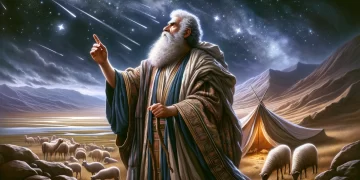Views: 17
Date of Events & Date of Writing & Primary Audience
- Date of Events: The event of Jacob wrestling with God in Genesis 32:22-32 is traditionally placed around 1900-1800 BC.
- Date of Writing: The Book of Genesis is traditionally attributed to Moses and is believed to have been written around 1446-1406 BC during the Israelites’ exodus from Egypt.
- Primary Audience: The primary audience was the Israelites, providing them with lessons on perseverance, divine encounter, and transformation.
Story Summary
- Summary: Genesis 32:22-32 recounts Jacob’s encounter with a divine being as he wrestles through the night, resulting in a name change to Israel and a permanent limp.
Story Background
- Background: This narrative occurs as Jacob prepares to meet his estranged brother Esau. Jacob is returning to Canaan after many years, facing uncertainty and fear about his reunion with Esau.
Story Highlights
- Highlights:
- Jacob’s Solitude: Jacob sends his family across the Jabbok River and is left alone.
- Wrestling with the Divine: Jacob wrestles with a man until daybreak (“So Jacob was left alone, and a man wrestled with him till daybreak”).
- Divine Encounter: The man touches Jacob’s hip, dislocating it, but Jacob persists and asks for a blessing (“I will not let you go unless you bless me”).
- Name Change: The man blesses Jacob and changes his name to Israel, meaning “he struggles with God” (“Your name will no longer be Jacob, but Israel, because you have struggled with God and with humans and have overcome”).
Story Purpose
- Purpose: To illustrate the transformative power of divine encounters, the importance of perseverance, and the change in identity that comes from a direct encounter with God.
Story Theme
- Theme: The themes include perseverance, divine encounter, transformation, identity, and blessing.
Jesus Connection
- Jesus Connection: The struggle and transformation of Jacob foreshadow the transformative encounters that Jesus offers. Jesus is also seen as the ultimate reconciler and one who blesses through perseverance in faith.
Kingdom Connection
- Kingdom Connection: The story emphasizes the Kingdom principle of striving with God in prayer and perseverance, illustrating that divine encounters lead to transformation and a new identity in God’s Kingdom.
Archaeology or Scientific Discovery
- Archaeology/Scientific Discovery: While direct archaeological evidence for Jacob’s wrestling event is not available, the location by the Jabbok River provides a historical and geographical context consistent with ancient narratives.
Hebrew Meanings of the Keywords
- Keywords:
- “Yisrael” (יִשְׂרָאֵל) – “Israel,” meaning “he struggles with God,” reflecting Jacob’s new identity after the encounter.
- “Abak” (אָבַק) – “Wrestle,” describing the physical struggle between Jacob and the divine being.
- “Penuel” (פְּנוּאֵל) – “Face of God,” the name Jacob gives to the place where he wrestled, acknowledging the divine nature of the encounter.
- “Berachah” (בְּרָכָה) – “Blessing,” referring to the blessing Jacob receives after his perseverance.
- “Naga” (נָגַע) – “Touch,” indicating the divine touch that dislocates Jacob’s hip, symbolizing both wounding and blessing.
Kingdom Teaching(s)
- Kingdom Teaching(s):
- Perseverance in Faith: Jacob’s wrestling represents the struggle and perseverance required in faith, a key principle in the Kingdom of God.
- Transformation through Encounter: The transformation of Jacob’s identity to Israel signifies the profound change that occurs through encountering God, pivotal in the Kingdom narrative.
- Blessing and New Identity: The blessing Jacob receives and his new name illustrate the Kingdom concept of receiving a new identity and divine favor through perseverance and faith.
By examining the story of Jacob wrestling with God through these various lenses, we gain a comprehensive understanding of the transformative power of divine encounters, the importance of perseverance in faith, and the new identity bestowed through God’s blessing, all within the framework of the Kingdom of God.
![Jacob Wrestles with God [Genesis 32:22-32]](https://kingj.tv/wp-content/uploads/2024/04/Jacob-wrestling-with-God-from-Genesis-32_22-32-1140x570.webp)


![Creation of the World [Genesis 1:1-2:3]](https://kingj.tv/wp-content/uploads/2024/05/DALL·E-2024-06-01-23.50.14-A-vibrant-and-majestic-landscape-format-image-depicting-the-Genesis-story-of-the-Creation-of-the-World-360x180.webp)
![Isaac’s Birth and Sacrifice [Genesis 21:1-7; 22:1-18]](https://kingj.tv/wp-content/uploads/2024/04/Isaacs-birth-and-sacrifice-from-Genesis-21_1-7-22_1-18-360x180.webp)
![Cain and Abel [Genesis 4:1-16]](https://kingj.tv/wp-content/uploads/2024/04/Genesis-story-of-Cain-and-Abel-360x180.webp)





